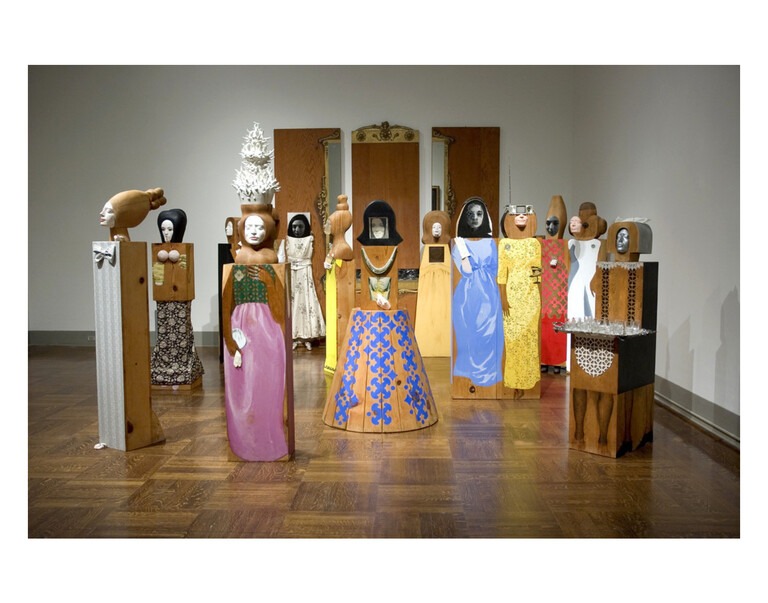|
Marisol "The Party" Pillow Set
$325.00
Availability:
In stock
SKU
MS-MARISOL28
Marisol "The Party" Pillow Set
Of all the artists associated with 1960s Pop art, Marisol remains the most enigmatic. Delightfully satirical and deceptively political, her sculptures cut to the heart of America's developing obsession with celebrity. By the mid-1960s, Marisol was hailed as the female artist of her generation. Thousands linked up to see her remarkable, life-size sculptures inspired by popular culture and women's roles in society. She became a celebrity herself, nicknamed the "Latin Garbo," for her apparent exoticism, beauty, and famous silences, and dubbed the "only girl artist with glamour" by fellow Pop artist Andy Warhol. Yet Marisol was always more than a muse or an icon of a single decade, and her nuanced work would transcend the Pop art movement that helped bring her to prominence.
TMA Exclusive Product
18" Square
Set of five 100% Cotton Canvas Cushion Covers with Polyester Pillow Inserts.
Care Instructions: Hand Wash, Hang Dry.
Made in the USA.
© Estate of Marisol / Artists Rights Society (ARS), New York

Marisol (Escobar) (American (born France), b. 1930), The Party, 1965-1966, assemblage of fifteen freestanding, life-size figures and three wall panels, with painted wood and carved wood, mirrors, plastic, television set, clothes, shoes, glasses, and other accessories, dimensions variable, Toledo Museum of Art (Toledo,Ohio), Museum Purchase Fund, by exchange, 2005.42A-P
The sculpture was created during Marisol's Pop art period. It features 15 freestanding, life-size figures spread about. Each model wears an up-scale dress, referring to its wealth and upper-class. Marisol uses her face in reference to some of the figures' features. None of the models interact with one another. Rather, they face away from each other. This work of art is exemplary of Marisol's feminist perspective. The life-size women adhere to the feminine, submissive norm and do not deviate from it. Marisol is critiquing their self-absorbed, submissive nature. She uses randomly assorted items in the construction to represent the instability of what it means to be a woman.
Of all the artists associated with 1960s Pop art, Marisol remains the most enigmatic. Delightfully satirical and deceptively political, her sculptures cut to the heart of America's developing obsession with celebrity. By the mid-1960s, Marisol was hailed as the female artist of her generation. Thousands linked up to see her remarkable, life-size sculptures inspired by popular culture and women's roles in society. She became a celebrity herself, nicknamed the "Latin Garbo," for her apparent exoticism, beauty, and famous silences, and dubbed the "only girl artist with glamour" by fellow Pop artist Andy Warhol. Yet Marisol was always more than a muse or an icon of a single decade, and her nuanced work would transcend the Pop art movement that helped bring her to prominence.
TMA Exclusive Product
18" Square
Set of five 100% Cotton Canvas Cushion Covers with Polyester Pillow Inserts.
Care Instructions: Hand Wash, Hang Dry.
Made in the USA.
© Estate of Marisol / Artists Rights Society (ARS), New York

Marisol (Escobar) (American (born France), b. 1930), The Party, 1965-1966, assemblage of fifteen freestanding, life-size figures and three wall panels, with painted wood and carved wood, mirrors, plastic, television set, clothes, shoes, glasses, and other accessories, dimensions variable, Toledo Museum of Art (Toledo,Ohio), Museum Purchase Fund, by exchange, 2005.42A-P
The sculpture was created during Marisol's Pop art period. It features 15 freestanding, life-size figures spread about. Each model wears an up-scale dress, referring to its wealth and upper-class. Marisol uses her face in reference to some of the figures' features. None of the models interact with one another. Rather, they face away from each other. This work of art is exemplary of Marisol's feminist perspective. The life-size women adhere to the feminine, submissive norm and do not deviate from it. Marisol is critiquing their self-absorbed, submissive nature. She uses randomly assorted items in the construction to represent the instability of what it means to be a woman.
Write Your Own Review




